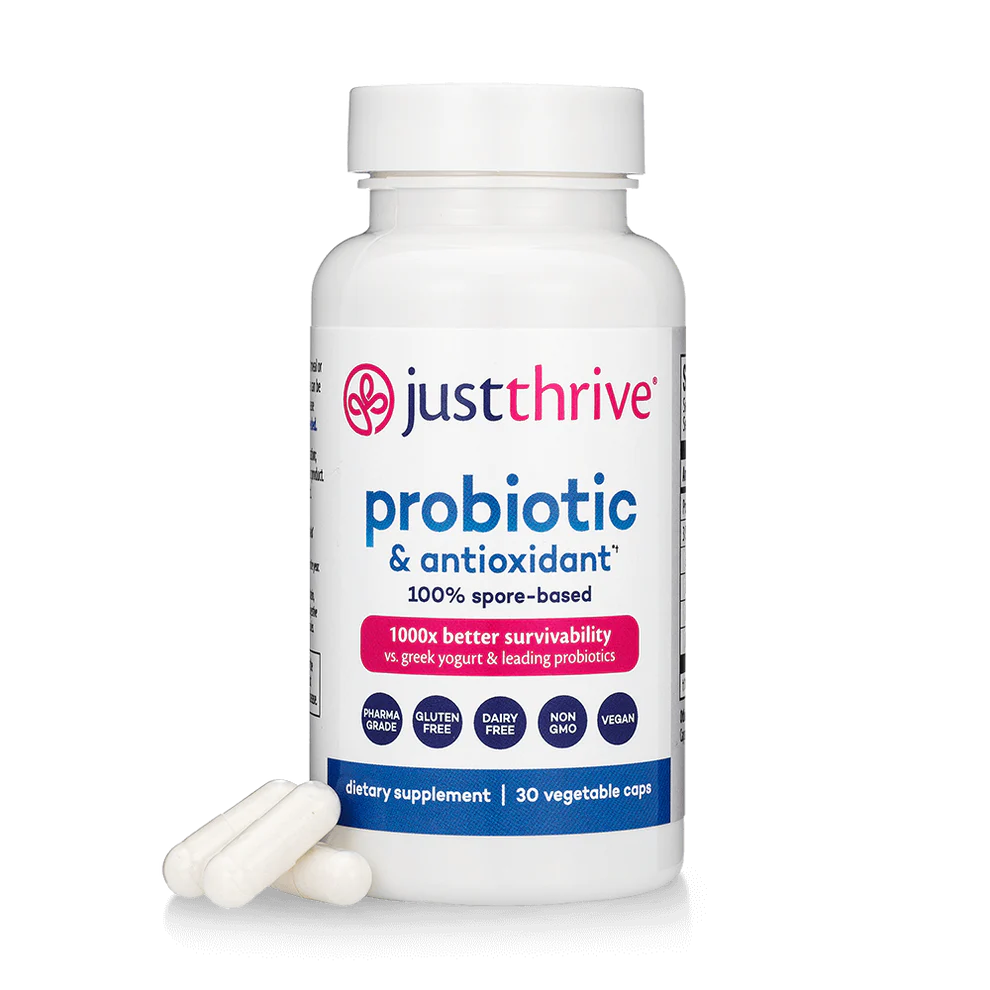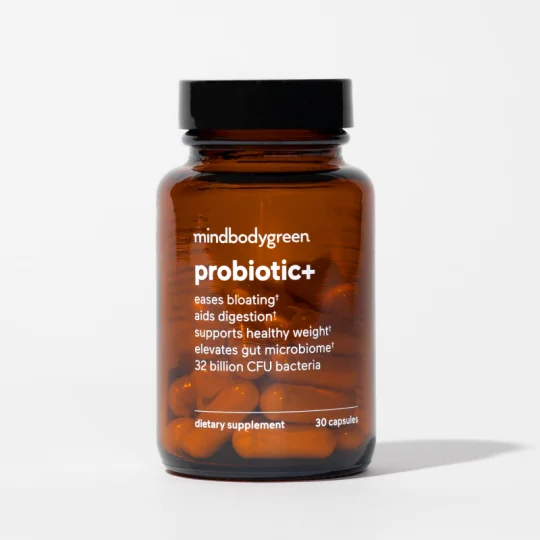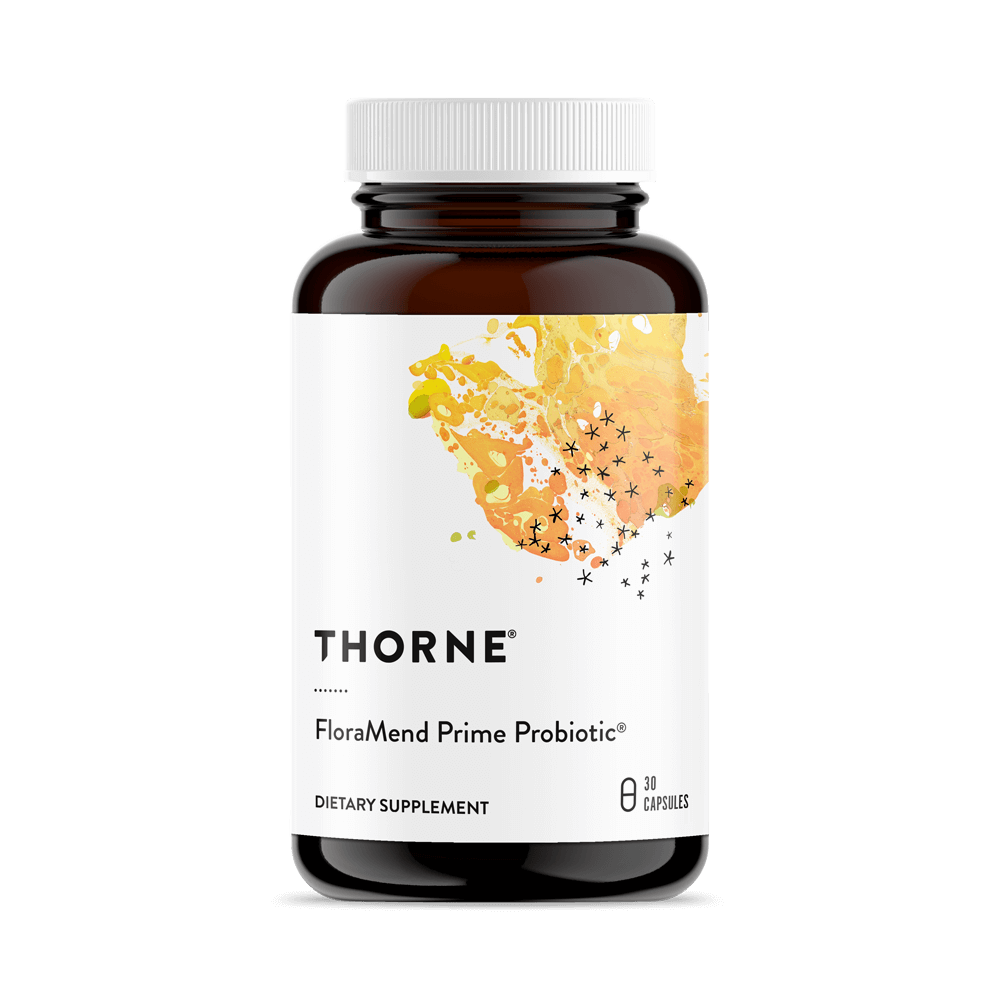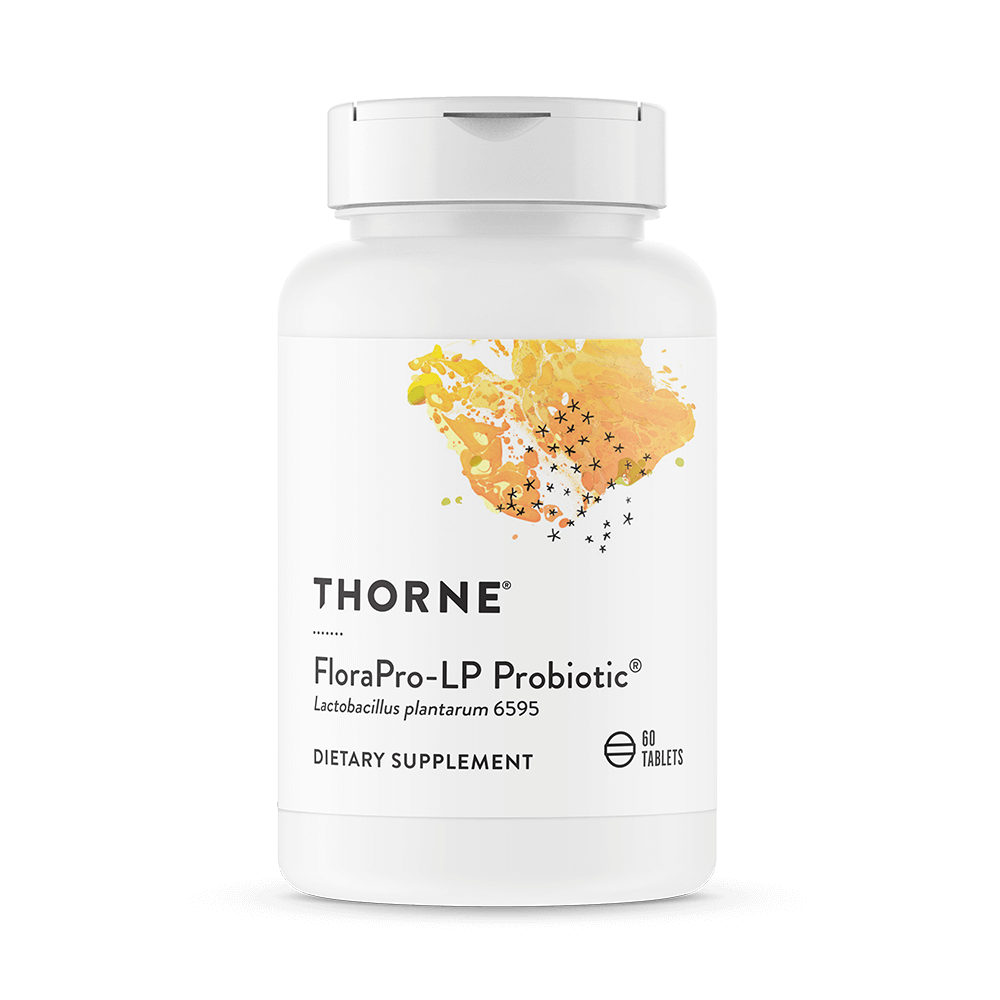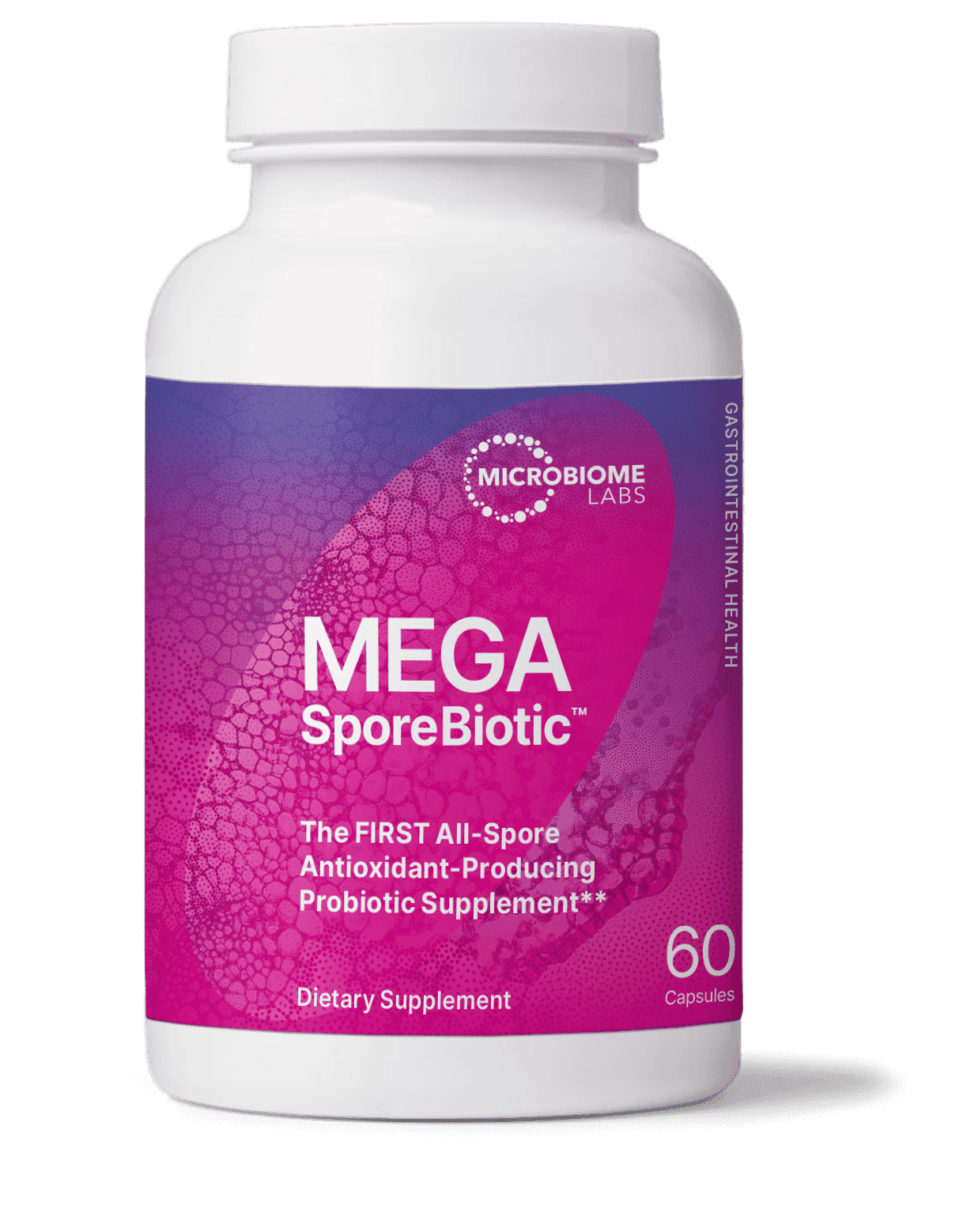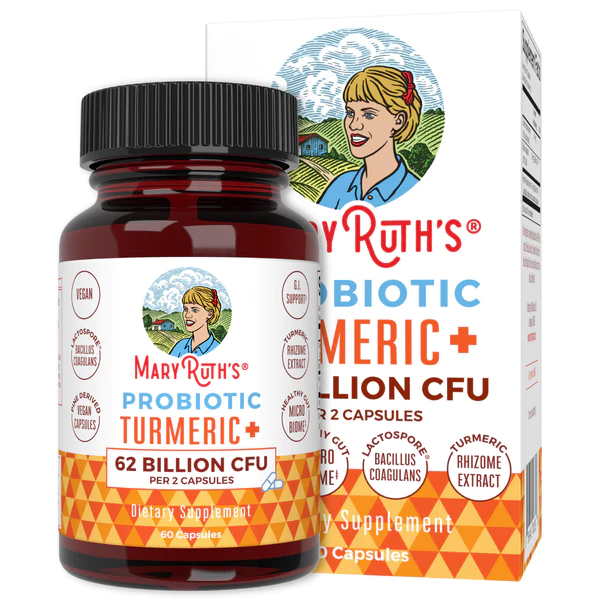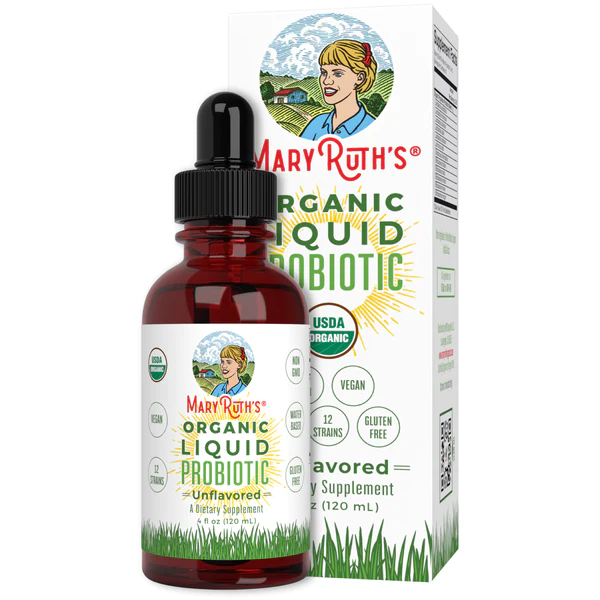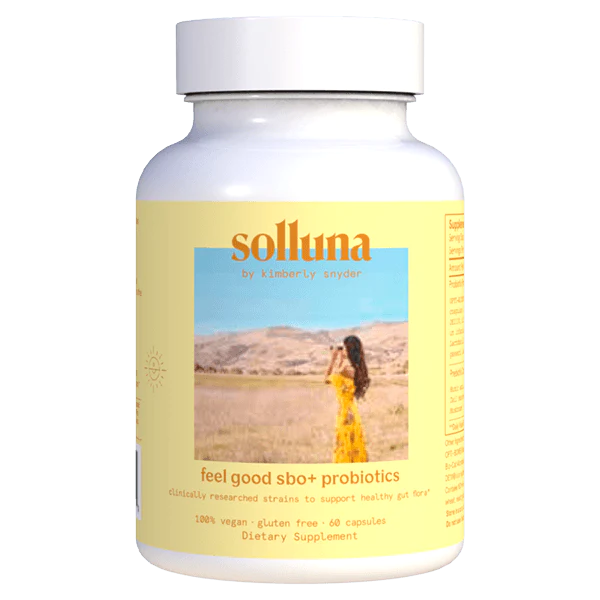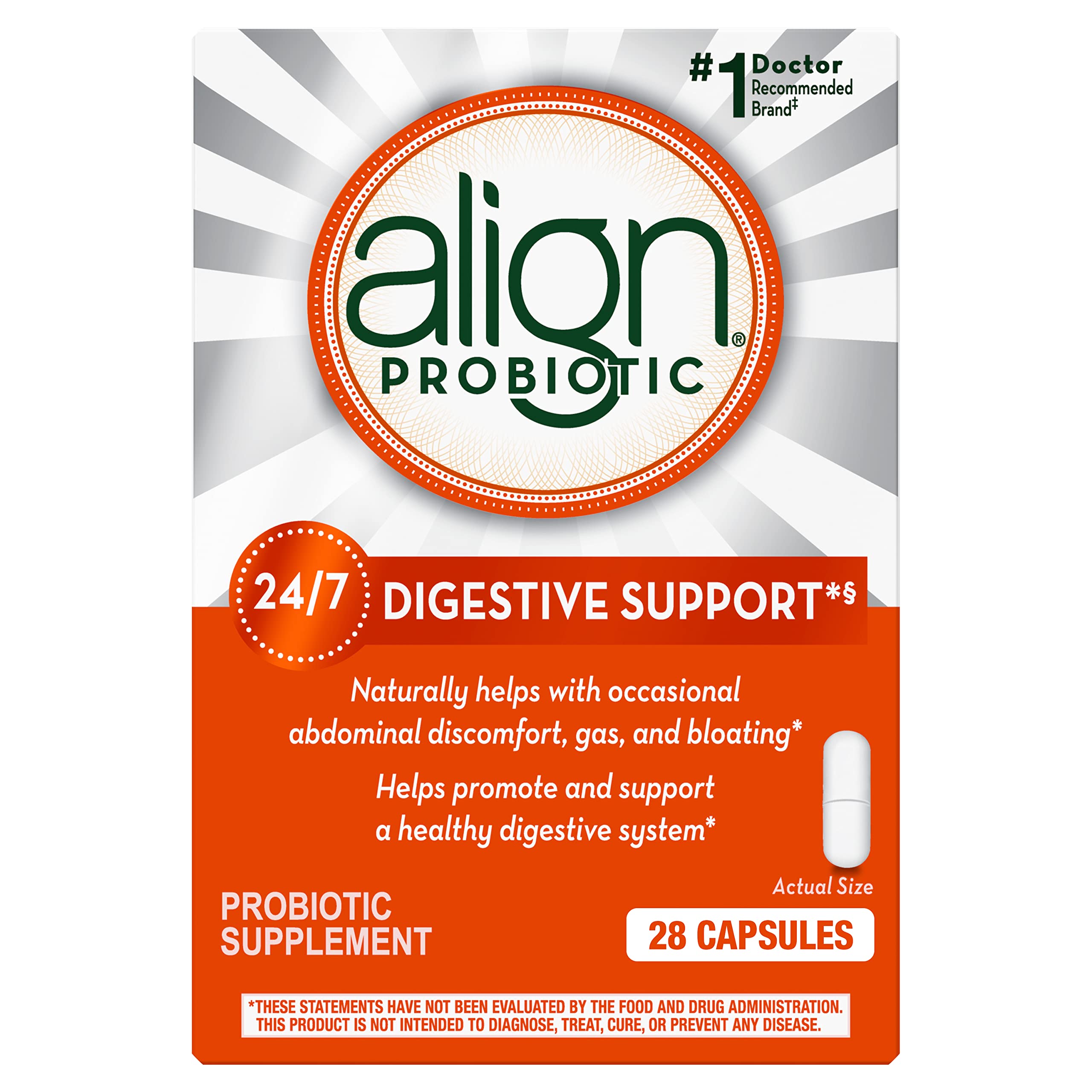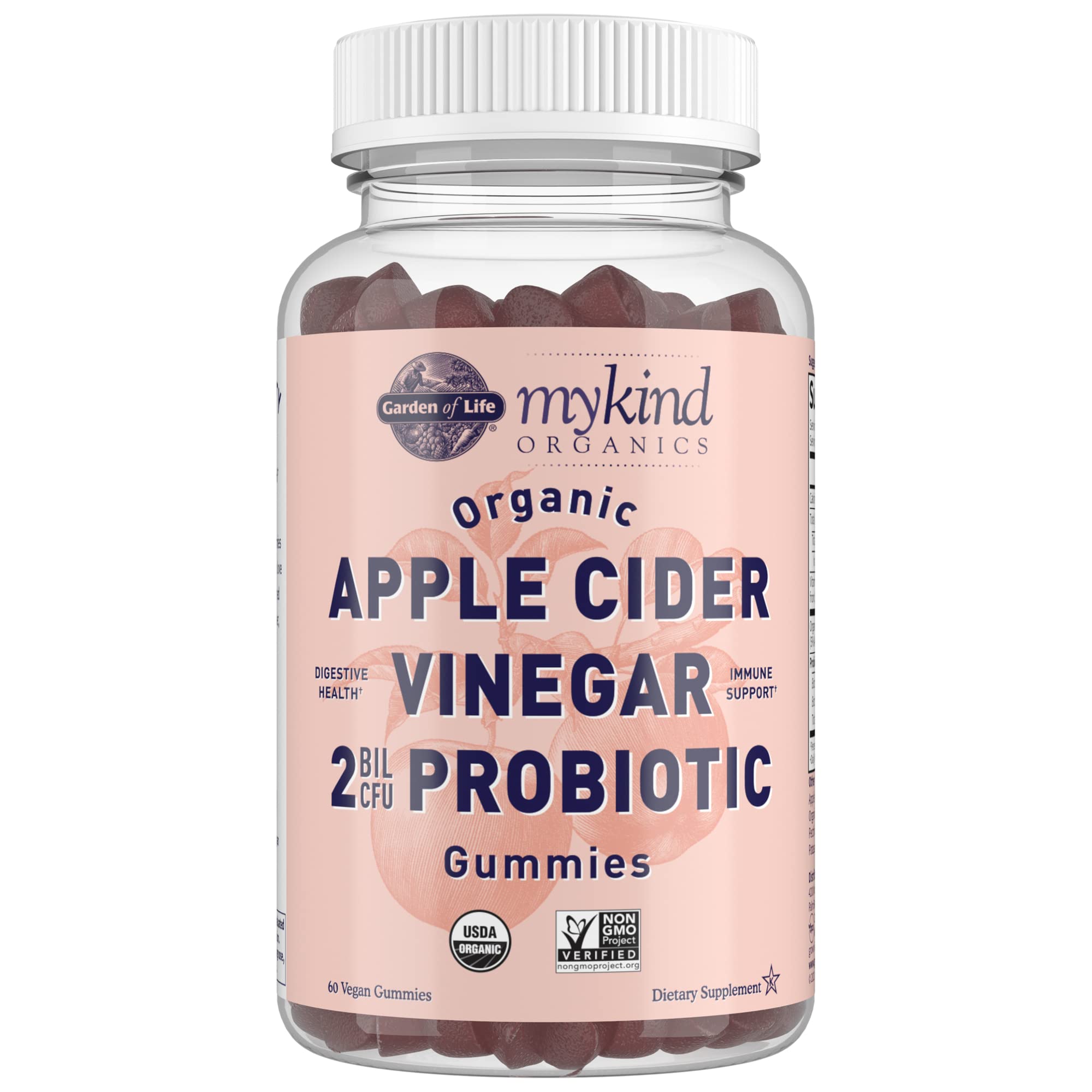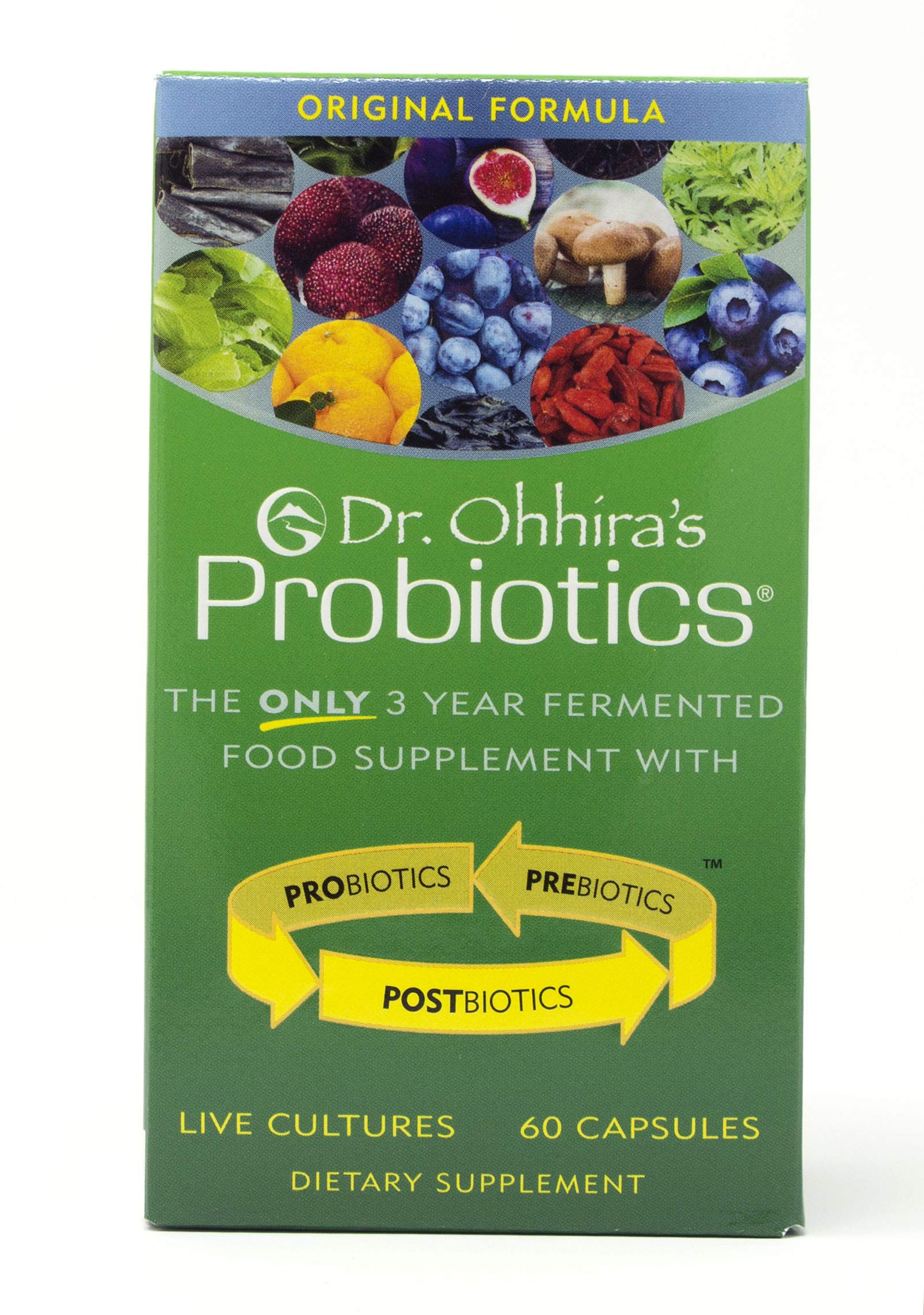We may receive a portion of sales if you purchase a product through a link in this article.
As gut health becomes more and more of a buzzword, so do the terms surrounding it. Many seem to be wondering: prebiotic vs. probiotic—which is best? And which do I actually need to improve my digestion and reap all the benefits (including: glowing skin, boosted immunity, and more)? Today, we’re diving in deep, exploring the basics of gut health, understanding the nitty-gritty of a prebiotic vs. probiotic, and the role each plays in optimizing your wellbeing.
Featured image from our interview with Mary Ralph Bradley by Michelle Nash.
- What are probiotics?
- Prebiotic vs. Probiotic
- The Power of a Diverse Microbiome
- How to Improve Your Gut Microbiome
- Why Taking a Probiotic Supplement Can Transform Your Health
- The Common Probiotics Species
- The Common Probiotics Strains
- What to Look for in a Probiotic Supplement
- 11 of the Best Probiotic Supplements

What are probiotics?
Probiotics are tiny living organisms. They include certain bacteria and yeasts, usually found in fermented foods or dietary supplements. The ISAPP (International Scientific Association for Probiotics and Prebiotics) defines probiotics as “live microorganisms that, when administered in adequate amounts, confer a health benefit on the host.” These microorganisms, which consist mainly of bacteria, are naturally present in fermented foods, but they may be added to other food products and are available as dietary supplements.
Bacteria tends to get a bad rap, but remember that you have two kinds of bacteria in (and on) your body—good bacteria and bad bacteria. Probiotics are made up of good bacteria that help keep your body healthy and working well. This good bacteria helps you in many ways, including fighting off bad bacteria when you have too much of it. In essence, probiotics are part of a larger picture concerning bacteria and your body: Your microbiome. Think of a microbiome as a diverse community of organisms, like prebiotics and probiotics, that work together to keep your body healthy.


Prebiotic vs. Probiotic
Prebiotic vs. Probiotic—what’s the difference? The two can be easily confused. Although they’re both important for human health, let’s differentiate between the two. After all, they have different roles. Found in certain foods or supplements, probiotics are beneficial bacteria. Prebiotics, on the other hand, are types of fiber that feed friendly bacteria in the digestive system. These substances come from types of carbs (mostly fiber) that humans can’t digest. The beneficial bacteria, in your gut, eat this fiber. They’re typically complex carbohydrates (such as inulin and other fructooligosaccharides) that microorganisms in the gastrointestinal tract use as metabolic fuel.
Although you don’t need to take a prebiotic for probiotics to work, taking a prebiotic may make your probiotics more effective. In essence, prebiotics may support a healthy gut—offering better digestive health, fewer antibiotic-related health problems, and other benefits. Despite less research on prebiotics than on probiotics, some studies indicate their efficacy.
The Power of a Diverse Microbiome
At any rate, eating balanced amounts of both probiotics and prebiotics can help ensure that you have the right distribution of bacteria to keep your gut microbiota healthy. And many factors, including the foods you eat, can impact the type of bacteria found in your digestive tract.
Generally speaking, a diverse microbiome is considered healthy. This is because the more species of bacteria you have, the more health benefits they may be able to contribute to. In fact, several studies show that elderly people possess a more diverse gut microbiota than younger adults. Between long-living Chinese, Japanese, and Italian people, all cohorts revealed diverse and balanced gut microbiota. Whereas, disturbed gut microbiotas with dysbiosis were observed in the elderly who suffer from different comorbidities.
Check out this guide for more gut-friendly habits.


How to Improve Your Gut Microbiome
Given that we all want to live long, healthful lives, let’s dive into simple ways to improve your gut microbiome.
- Eat a diverse diet, rich in whole foods and antioxidants. A diet consisting of different food types can lead to a more diverse microbiome, which is beneficial for your health. When in doubt, cook the rainbow.
- Prioritize the Mediterranean diet. There are a variety of reasons to eat as the Mediterraneans do, but mainly because of the emphasis on vegetables, fruits, beans, and legumes. These are high-fiber, gut-friendly foods that promote the growth of beneficial bacteria. Eating a range of fresh, whole foods, mainly from plant sources, is shown to improve gut health.
- Choose fermented foods. Fermented foods, like plain yogurt, kimchi, and tempeh can benefit the microbiome. They enhance its function and reduce the abundance of disease-causing bacteria in the intestines.
- Add in prebiotics. As mentioned, prebiotics are key. (And to clarify, it’s not really a question of prebiotic vs. probiotic—both work in tandem to support healthy digestion.) Many fruits, vegetables, and whole grains contain prebiotics, but they can also be found on their own. Resistant starch (like an unripe banana) can also be a prebiotic. If eating an unripe banana sounds unappetizing, you can also benefit from prebiotics by eating cooked and cooled potatoes and rice. The cooling turns some of the digestible starches into resistant starches.
- Increase your intake of probiotics. One of the most powerful ways? Consider a probiotic supplement.
Why Taking a Probiotic Supplement Can Transform Your Health
When it comes to showing your gut some love, consider incorporating a probiotic supplement. Ongoing research shows that taking a probiotic not only supports a healthy gut, but it can also contribute to decreased levels of anxiety, depression, and more. The gut-brain connection is fascinating, evidence in itself of the power of a high-quality probiotic supplement. Furthermore, the right probiotic supplement can keep your vaginal bacteria balanced, your digestion humming along, and your immune system supported.
Be sure to talk with your healthcare practitioner before starting supplementation, especially if you are taking other medications or have any underlying health conditions.


The Common Probiotics Species
Your bowels host an estimated 100 trillion microorganisms from more than 500 different species. That’s a lot. To simplify, the most commonly consumed probiotics are strains of two main species: Bifidobacteria and Lactobacillus. These species are also the most studied of all probiotics. Bifidobacteria are commonly used in foods and supplements. They’re thought to:
- support the immune system
- limit the growth of harmful bacteria in the intestine
- help in breaking down lactose into nutrients the body can use
Lactobacillus is the species of bacteria that produce lactase, the enzyme that breaks down lactose, or milk sugar. These bacteria also produce lactic acid, which helps control the population of bad bacteria. It also serves as muscle fuel and increases the body’s absorption of minerals. Lactobacillus bacteria are found naturally in the mouth, small intestine, and vagina.
The Common Probiotics Strains
Probiotic strains are genetic subtypes of species. Each probiotic strain has a different effect on the body. These are six common strains of probiotics that you’ll find on food and supplement labels:
Bifidobacteria animalis. This strain helps aid digestion and fight food-borne bacteria. It’s also thought to boost your immune system.
Bifidobacteria breve. This strain lives in your digestive tract and in the vagina. In both places, it fights off infection-causing bacteria or yeast. It helps your body absorb nutrients by fermenting sugars. It also breaks down plant fiber to make it digestible.
Bifidobacteria lactis. This is derived from raw milk. It’s an ingredient found in some infant formula, but it also serves as a starter for buttermilk, cottage cheese, and other cheeses.
Bifidobacteria longum. This strain lives in your gastrointestinal tract. It helps break down carbohydrates.
Lactobacillus acidophilus. This strain is found in the small intestine and in the vagina. Like bifidobacteria breve, it helps digestion and may help fight off vaginal bacteria. You can find it in yogurt and fermented soy products, such as miso.
Lactobacillus reuteri. This strain is found in the intestine and mouth. One study showed that it decreased the oral bacteria that cause tooth decay. It’s also thought to help the digestive system.


What to Look for in a Probiotic Supplement
When purchasing a probiotic product, check the label for the type of species and strain to make sure they align with your specific health needs. Look for language that indicates there are live and active bacterial cultures. Locate the amount of CFUs (colony forming units), which are the number of live and active microorganisms in each serving. For overall health, reach for a probiotic with multiple strains.
Some probiotics require refrigeration, some are shelf-stable. Always look at the product packaging to see whether or not the probiotic needs to be stored in the refrigerator. If you travel frequently or prefer to store your supplements at room temperature, choose a product accordingly.
11 of the Best Probiotic Supplements
If you’re not sure how to choose the right probiotic for your health goals and lifestyle, we put together a list of our top 11 probiotics. Whether you’re looking for the best probiotic for gut health, mental health, acne, or another area of your wellness you’d like to support, we’ve got you covered.
Just Thrive Probiotic
My go-to probiotic, Just Thrive’s breakthrough, award-winning probiotic contains the proprietary strain, Bacillus Indicus HU36®. It produces antioxidants directly in the digestive system where they can be best absorbed by your body. Furthermore, Just Thrive offers the first 100% spore-forming probiotic and antioxidant supplement. Unlike most other probiotics, it guarantees the survivability through the stomach and upper digestive system. Many reviewers rave about their non-existent digestive woes and bloating when taking this probiotic.
mindbodygreen probiotic+
This probiotic+ supplement is the only blend in the world with a unique combination of four strains, specifically designed to ease bloating, aid digestion, and elevate your gut microbiome. These probiotic strains have been clinically shown to support gut health and maintain key, daily functions of the digestive system.
Thorne FloraMend Prime Probiotic
FloraMend offers benefits for occasional digestive upset, nutritional support for a challenged immune system, and balanced gut flora for healthy neurotransmitter production (important for a positive mood and healthy outlook). This everyday probiotic is for individuals minding their gut health and who have identified weight loss or maintenance as a health goal.
Thorne FloraPro-LP Probiotic
Ideal for individuals on antibiotics, pre/post-surgery, or those with a weakened or impaired immune system, this probiotic by Thorne is shown to improve gut health post-illness or surgery. Its unique genome allows this bacteria species to more easily adapt to different environmental conditions, and it has a high tolerance for high acidic environments, such as the acidity of the stomach.
Microbiome Labs MegaSpore Biotic
Like Just Thrive’s probiotic, MegaSporeBiotic is a 100% spore-based, broad-spectrum probiotic shown to maintain healthy gut barrier function. This unique all-spore formula effectively reconditions the gut by promoting microbial diversity. Best of all, MegaSporeBiotic boasts a five-year shelf-life, does not require refrigeration, and maintains a healthy gut microbiome.
Mary Ruth’s Probiotic Turmeric+
This blend of turmeric and three probiotic strains was formulated specifically to support the gastrointestinal tract. This supplement has been shown to promote gut health in a variety of ways, including modulating the microbiome and supporting immune function. Additionally, curcumin—the main active component of turmeric—has been added to this supplement as research suggests it may be beneficial for supporting a healthy GI tract as well.
Mary Ruth’s Organic Liquid Probiotics
This 100 precent plant-based, raw, and vegan USDA certified organic liquid probiotic is extracted with water from a proprietary blend of three organic grasses. Mary Ruth’s shelf-stable liquid probiotic is formulated with 12 probiotic strains to support gut health and the immune system—no refrigeration required.
Solluna Feel Good SBO Probiotics+
A soil-based organisms probiotic (SBO) is a powerful way to further balance one of the most foundational processes in your body, digestion, so everything else functions better. The powerful benefits of Solluna’s probiotic supplement: Boosts immune system, improves skin health, supports healthy mood, contains prebiotics and postbiotics, and more. They’ve also added humic acid, a super nutrient that’s loaded with minerals, shilajit extract, an ancient postbiotic compound with numerous health benefits, turkey tail mushroom—a powerful immunity-boosting prebiotic—and chaga mushroom, a nutrient dense, anti-aging superfood.
Align Probiotic 24/7 Digestive Support
Widely known as a favorite among gastroenterologists, this probiotic supplement supports healthy digestion and can help with occasional cramping, bloating, and gas. High-quality, this probiotic product has a simple, clean formula engineered to deliver an effective dose. Align is gluten-free, soy-free, and vegetarian.
Garden of Life, MyKind Organics, Organic Apple Cider Vinegar Probiotic Gummies
This unique apple cider vinegar formula contains 2 billion CFU of probiotics, including clinically studied strains to support digestive and immune health. These delicious gummies contain 700mg of apple cider vinegar offering the benefits of ACV without any artificial ingredients or gelatin.
Dr. Ohhira’s Probiotics
No refrigeration required, these probiotics contain 12 strains, making them much more potent and longer lasting in your gut. Additionally, the breathable capsule contains food for the probiotics to eat, meaning the bacteria are alive and active. Last but not least, this supplement is enhanced with super fruits like goji berries and blueberries.


